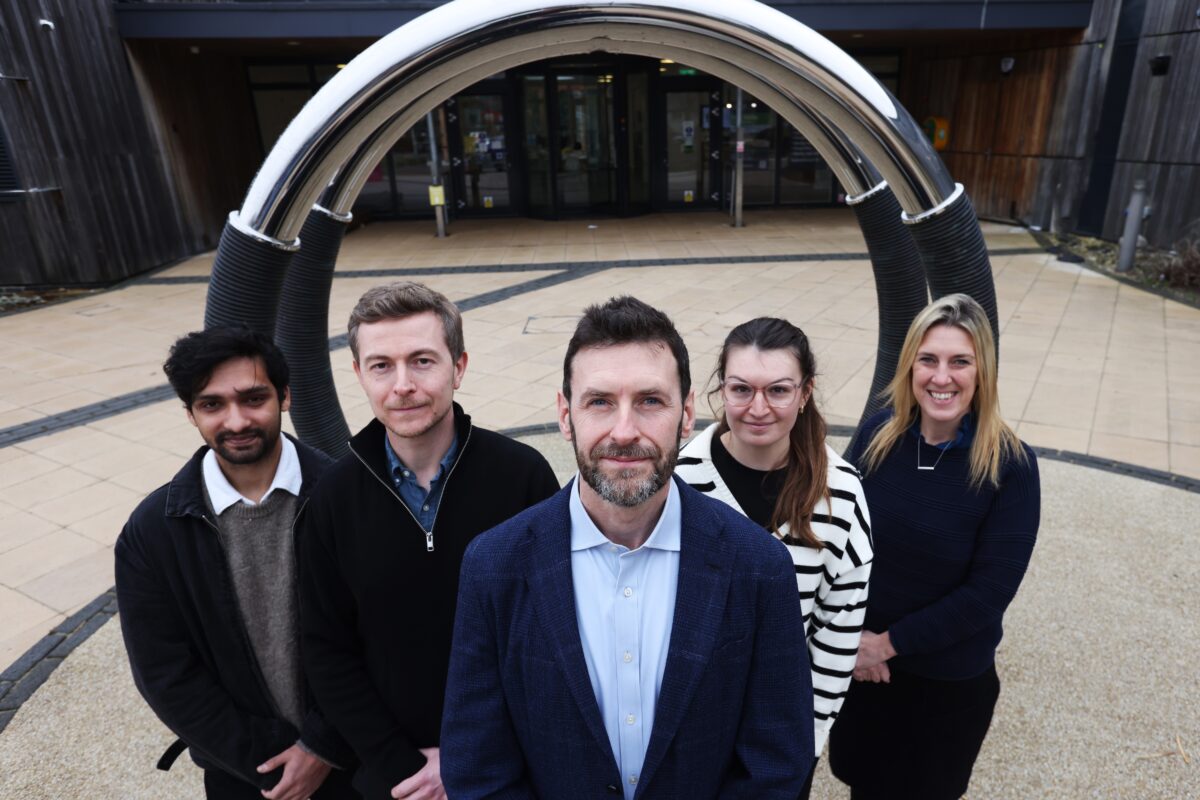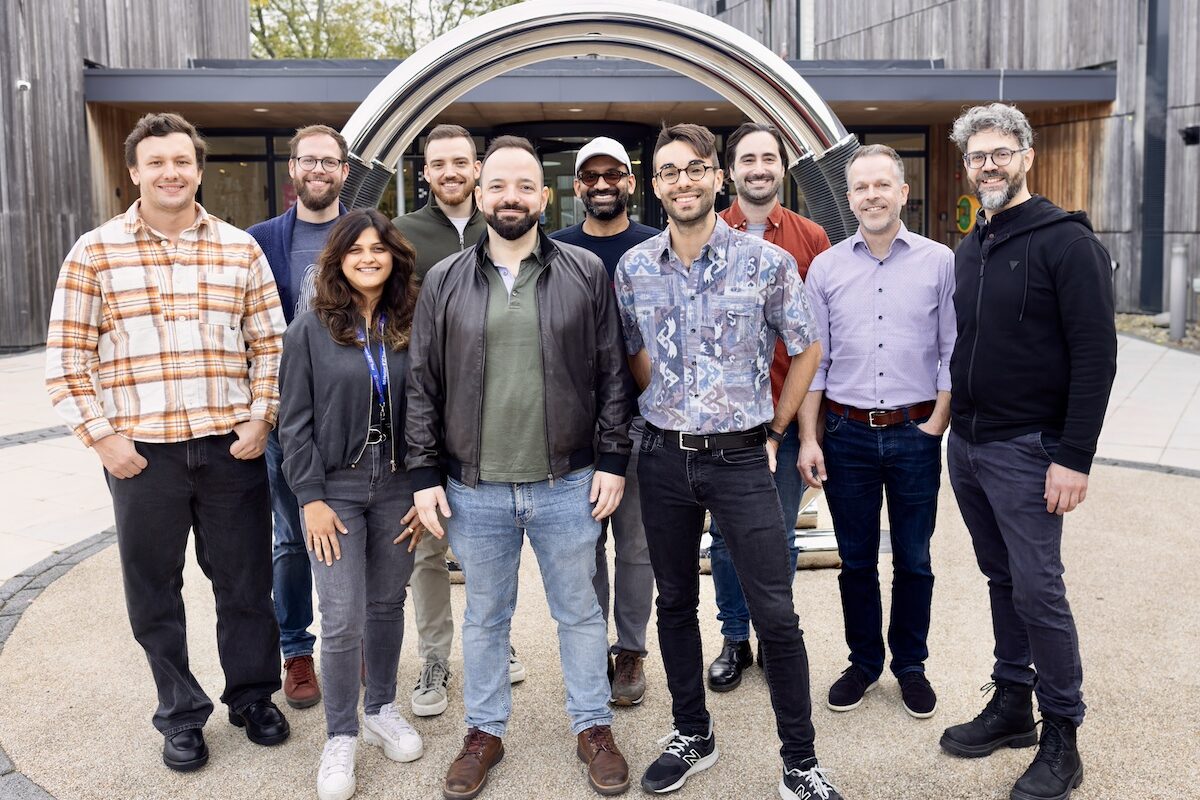It has been another busy few months with exciting developments for The Oxford Trust as well as companies working in our innovation centres.
Opening of the Oxford Centre for Innovation at Blue Boar Court
In May, we celebrated the official opening of our Oxford Centre for Innovation at Blue Boar Court on Alfred Street. This historic building has had several lives: originally the gymnasium for the University of Oxford, it was then a printing house and is now the Trust’s fourth home for its Oxford Centre for Innovation.
We are pleased to welcome a thriving community of pioneering businesses to the Centre, including Oxford Drug Design, Optellum, Visual Meaning, Aether, Q-CTRL, Mathys & Squire, Drees & Sommer UK and Oxford Innovation Space. Companies that work in our innovation centres have the bonus of being able to use our sites in Headington and the city centre for co-working and meeting spaces.
Funding success
 There has been a significant funding announcement to celebrate from AI accelerator start-up Lumai. Based in the Wood Centre for Innovation, this innovative business secured nearly £8 million in investment this spring. Lumai is using optical computing to transform the future of AI processing. Their breakthrough technology will help AI data centres dramatically reduce costs and boost performance while minimising energy consumption.
There has been a significant funding announcement to celebrate from AI accelerator start-up Lumai. Based in the Wood Centre for Innovation, this innovative business secured nearly £8 million in investment this spring. Lumai is using optical computing to transform the future of AI processing. Their breakthrough technology will help AI data centres dramatically reduce costs and boost performance while minimising energy consumption.
Lumai CTO and Co-Founder Dr James Spall commented: “Next-generation AI won’t happen without a major shift. Our optical computing technology unlocks scalability while cutting energy use, driving down the cost of AI.” Read more here.
Awards and recognition
 Wood Centre for Innovation-based Bioarchitech has been named Startup Spotlight 2025 winner at ChinaBio in Shanghai for its novel RNA therapeutic BA-R166. This biotech enterprise is pioneering new cancer treatments.
Wood Centre for Innovation-based Bioarchitech has been named Startup Spotlight 2025 winner at ChinaBio in Shanghai for its novel RNA therapeutic BA-R166. This biotech enterprise is pioneering new cancer treatments.
Kevin Maskell, CEO & CSO, Bioarchitech explained: “In recent years, the most effective new cancer drugs have been immunotherapies. We believe this kind of rapid, interventional immunotherapy can become the fourth pillar of oncology, reducing the need for life-limiting surgeries in the future”.
This award recognised the fast and cost-efficient virus-based treatment that is being developed in their Oxford lab. Designed for all patients with early-stage cancer, right after diagnosis and before surgery. Read more about Bioarchitech’s research.
Also based at the Wood Centre for Innovation, PicturaBio is celebrating after being included in the Biotechnology and Biological Sciences Research Council (BBSRC) impact showcase 2025. Their story – highlighting how Pictura Bio is using AI for ultra-rapid diagnostics to tackle respiratory infections and antimicrobial resistance – was featured among some of the UK’s most exciting bioscience breakthroughs. Read more about PicturaBio’s research here.
In the news
 Jack Fertility, the Wood Centre for Innovation-based start-up, recently gave an insightful interview on what it means to build a pioneering start-up. In the Margin for Error podcast, CEO and co-founder Lily Elsner discusses what it means to build a start-up with humour, humanity, and commercial strategy in equal measure. Jack Fertility is the Oxford-based start-up behind the UK’s first fully postal sperm test kit. Find out more here.
Jack Fertility, the Wood Centre for Innovation-based start-up, recently gave an insightful interview on what it means to build a pioneering start-up. In the Margin for Error podcast, CEO and co-founder Lily Elsner discusses what it means to build a start-up with humour, humanity, and commercial strategy in equal measure. Jack Fertility is the Oxford-based start-up behind the UK’s first fully postal sperm test kit. Find out more here.
Based at the Oxford Centre for Innovation, Oxford Drug Design is researching cancer treatments with a highly innovative molecule via a new mechanism of action on novel targets. In this interview with Mike Loder for Ticker, CEO Dr Alan D. Roth, highlights the urgent need for further innovative oncology therapeutics, emphasising that while progress has been made, there is still much work to be done to address the unmet need. Listen to the conversation here.
Partnership, collaborations and networks
With a busy events calendar across the spring and summer, so many of our client businesses have been out sharing updates of the innovative research happening in Oxford. Bioarchitech spoke at OBN’s Bio Trinity annual conference in London this April. They shared details of how they are are mining the genomes of viruses to supercharge cancer immunotherapy, read the full story here.
London Tech Week is a key event for deep-tech innovation. Lumai’s Dr James Spall was there showcasing future next-generation AI solutions at the UK Trade Stand.
At the beginning of the year, Helio Display Materials attended the Photonics West conference in San Francisco. Helio’s CTO, Bernard Wenger, delivered a talk on how perovskites are set to disrupt the micro display industry – bringing higher efficiency, better colour purity, and scalable manufacturing to next-gen displays.
Quantum technology company, Q CTRL completed a collaborative study with Network Rail and the UK Department for Transport (DfT) that found quantum software can improve the performance of quantum hardware enough to bring forward the projected timeline for practical quantum advantage in transport logistics, (read their announcement here).
Optellum, the leader in AI-enabled lung cancer diagnosis, announced it has entered an agreement with Bristol Myers Squibb (one of the world’s largest pharmaceutical companies). This partnership will leverage AI in early diagnosis and precision lung cancer care. Under the agreement, Optellum will apply its AI-powered imaging & clinical decision support platform to evaluate the real-world impact on patient outcomes. Read more here.
Also supporting cutting-edge transport research, Oxford Centre for Innovation- based Visual Meaning, showcased their recent work mapping the EU Rail Ecosystem at the RailDataEurope conference in Cluj, Romania, find out more here.
Aether, air quality and climate change consultancy, joined experts in Brussels this month for the annual NECD (National Emissions Commitments Directive) review. Read more here.



